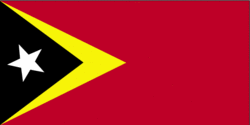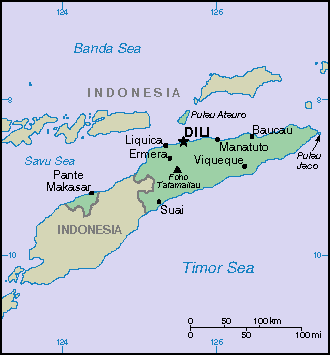Traveling Luck for East Timor. East Timor, Oceania
East Timor is located in Southeastern Asia, northwest of Australia in the Lesser Sunda Islands at the eastern end of the Indonesian archipelago; note - East Timor includes the eastern half of the island of Timor, the Oecussi (Ambeno) region on the northwest portion of the island of Timor, and the islands of Pulau Atauro and Pulau Jaco.
Land in East Timor is mountainous.
Timorese land covers an area of 15007 square kilometers which is slightly larger than Connecticut
East Timor has borders with Indonesia for 228km.
 Timorese national flag (Flag of East Timor)
Timorese national flag (Flag of East Timor)
As for the Timorese climate; tropical; hot, humid; distinct rainy and dry seasons.
Timorese speak Tetum (official), Portuguese (official), Indonesian, English
note: there are about 16 indigenous languages; Tetum, Galole, Mambae, and Kemak are spoken by significant numbers of people.
Places of note in East Timor
 Timorese map
Timorese map
Regions of East Timor
The Portuguese began to trade with the island of Timor in the early 16th century and colonized it in mid-century. Skirmishing with the Dutch in the region eventually resulted in an 1859 treaty in which Portugal ceded the western portion of the island. Imperial Japan occupied East Timor from 1942 to 1945, but Portugal resumed colonial authority after the Japanese defeat in World War II. East Timor declared itself independent from Portugal on 28 November 1975 and was invaded and occupied by Indonesian forces nine days later. It was incorporated into Indonesia in July 1976 as the province of East Timor. An unsuccessful campaign of pacification followed over the next two decades, during which an estimated 100,000 to 250,000 individuals lost their lives. On 30 August 1999, in a UN-supervised popular referendum, an overwhelming majority of the people of East Timor voted for independence from Indonesia. Between the referendum and the arrival of a multinational peacekeeping force in late September 1999, anti-independence Timorese militias - organized and supported by the Indonesian military - commenced a large-scale, scorched-earth campaign of retribution. The militias killed approximately 1,400 Timorese and forcibly pushed 300,000 people into West Timor as refugees. The majority of the country's infrastructure, including homes, irrigation systems, water supply systems, and schools, and nearly 100% of the country's electrical grid were destroyed. On 20 September 1999 the Australian-led peacekeeping troops of the International Force for East Timor (INTERFET) deployed to the country and brought the violence to an end. On 20 May 2002, East Timor was internationally recognized as an independent state.
In late 1999, about 70% of the economic infrastructure of East Timor was laid waste by Indonesian troops and anti-independence militias, and 300,000 people fled westward. Over the next three years, however, a massive international program, manned by 5,000 peacekeepers (8,000 at peak) and 1,300 police officers, led to substantial reconstruction in both urban and rural areas. By the end of 2005, all refugees either returned or resettled in Indonesia. Non-petroleum GDP growth was held back in 2003 by extensive drought and the gradual winding down of the international presence but recovered somewhat in 2004. The country faces great challenges in continuing the rebuilding of infrastructure, strengthening the infant civil administration, and generating jobs for young people entering the work force. The development of oil and gas resources in nearby waters has begun to supplement government revenues ahead of schedule and above expectations - the result of high petroleum prices - but the technology-intensive industry does little to create jobs for the unemployed, because there are no production facilities in Timor and the gas is piped to Australia. The parliament in June 2005 unanimously approved the creation of a Petroleum Fund to serve as a repository for all petroleum revenues and preserve the value of East Timor's petroleum wealth for future generations.
Timorese natural resources include gold, petroleum, natural gas, manganese, marble
Timor comes from the Malay word for "East"; the island of Timor is part of the Malay Archipelago and is the largest and easternmost of the Lesser Sunda Islands
Timorese religion is Roman Catholic 90%, Muslim 4%, Protestant 3%, Hindu 0.5%, Buddhist, Animist (1992 est.).
Natural hazards in East Timor include floods and landslides are common; earthquakes, tsunamis, tropical cyclones.
Travel Advice for East Timor
East Timor (Democratic Republic of)SUMMARY
- The British Embassy in East Timor closed on 13 October 2006. Consular services for British nationals are now provided by the British Embassy in Jakarta (please see contact details below)
- We advise against all but essential travel to East Timor. There were renewed outbreaks of violence (including gun violence) in Dili on 25 October 2006, which led to the Comoro airport being closed. The airport reopened on 26 October 2006. However, there is the potential for continued violence in Dili, particularly in the vicinity of the airport (Comoro to Fatuhada and Marconi) and on the airport road. You should avoid these areas, where possible, and check for updates locally (e.g. with your airline).
- There is the possibility of large-scale demonstrations taking place in Dili, which have the potential to turn violent. You should take sensible precautions for your personal safety and avoid large crowds and demonstrations.
- If you decide to travel to East Timor, you should ensure that you are content with your own and your family's security arrangements. You should regularly monitor all available information on the local situation, and ensure that your travel documents are up-to-date and readily available in case you need to leave the country at short notice. You should also avoid the areas surrounding IDP (internally displaced persons) camps and government buildings, including the Palacio da Cinzas and Palacio do Governno and refrain from going outside after dark.
- East Timor shares with other countries in South East Asia a threat from terrorism. Attacks could be indiscriminate and against civilian targets.
- Tropical cyclones sometimes occur in East Timor. For further information, please see Hurricanes.
- We strongly recommend that you obtain comprehensive travel and medical insurance before travelling. You should check any exclusions, and that your policy covers you for the activities you want to undertake. Please see: Travel Insurance.
SAFETY AND SECURITY
We advise against all but essential travel to East Timor. Outbreaks of violence and armed clashes took place in the country in May 2006. Although security in East Timor has improved following the arrival of international forces on 25 May 2006, the situation remains volatile and could deteriorate at short notice.
Crime
There have been a small number of personal attacks in Dili during both the hours of daylight and darkness, including on foreigners. You are advised to remain vigilant at all times and to avoid displaying expensive items of jewellery or large sums of money.
Local Travel
Accommodation and transport for independent travellers are extremely limited, particularly outside the capital, Dili.
You are advised to take extra caution if travelling during the hours of darkness, and to avoid travelling alone.
You should be particularly vigilant if travelling to border areas, as there remains the potential for trouble there.
Road Safety
Drivers should take extra care on the roads, especially when it is wet. Travel in convoy whenever possible. Main routes are often single-track mountain roads, which can deteriorate rapidly and become impassable, particularly during the rainy season (December-April). Road quality even in Dili is poor and there is little street lighting. You should avoid walking on the road at night where possible.
Drivers must hold a current driving licence valid for the class of vehicle they plan to drive. Third Party motor vehicle insurance is not available.
Sea Safety
There have been incidents of piracy and armed robbery against ships in neighbouring waters. Mariners are advised to be vigilant; reduce opportunities for theft; establish secure areas onboard; and report all incidents to the coastal and flag state authorities.
LOCAL LAWS AND CUSTOMS
ENTRY REQUIREMENTS
Single parents or other adults travelling alone with children should be aware that some countries require documentary evidence of parental responsibility before allowing lone parents to enter the country or, in some cases, before permitting the children to leave the country.
HEALTH
Medical services in East Timor are severely limited. There are no dental or optical services.
Dengue Fever and Japanese Encephalitis are common throughout the island. There is usually an increase in Dengue fever cases during the rainy season, which starts in November. Dengue is a mosquito-borne infection found in tropical and sub-tropical regions around the world. You should take normal precautions against mosquito bites.
For more information, including the latest human fatality figures, please consult the World Health Organisation's Dengue fact sheet (under ‘health topics') at the following website: WHO Factsheets.
Malaria is also common throughout the island. More than three-quarters of British travellers who contracted malaria in 2005 did not take preventive measures, such as malaria prevention tablets. However, malaria can occur despite appropriate prevention, and therefore you should promptly seek medical care in the event of a fever or flu-like illness in the first year following your return from travelling to a malaria risk country. Before travelling you should seek medical advice about the malaria risk in East Timor.
You should seek medical advice before travelling and ensure that all appropriate vaccinations are up-to-date. For further information on health, including outbreaks of regional diseases, check the Department of Health and World Health Organisation websites at: www.dh.gov.uk and http://www.who.int/en/.
Avian Influenza (Bird Flu)
There have been no reported cases of avian influenza (bird flu) in East Timor during the current series of outbreaks. But the World Health Organisation (WHO) has confirmed cases elsewhere in the region.
You should read this advice in conjunction with the Avian and Pandemic Influenza Factsheet
NATURAL DISASTERS
East Timor is located in an earthquake zone and major earthquakes can occur at any time.
GENERAL
The British Embassy in Dili closed on 13 October 2006. Consular services for British nationals are now provided by the British Embassy in Jakarta (please see contact details below).
You should ensure that your travel documents are up-to-date and available, in case you need to leave at short notice.
We strongly advise you to keep a photocopy of the relevant pages of your passport, to avoid any complications.
You are strongly advised to bring either US dollars in cash or travellers cheques, as the US dollar is the currency in use in East Timor.
Money
The limited banking system in East Timor will not exchange Pounds Sterling cash or sterling travellers cheques. You are also advised that the same often applies to the Euro currency.

 Search
Search East Timor country profile
East Timor country profile Travel advice for East Timor
Travel advice for East Timor